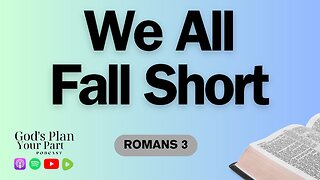Jeremiah 26-29 | Yokes, Letters, Visions, and Coffee Cup Verses
For today's full reading download the full podcast.
Listen on Apple Podcasts: https://podcasts.apple.com/us/podcast/gods-plan-your-part/id1662005086
Listen on Spotify: https://open.spotify.com/show/2IjaYq4cYgy8WIcw5zWj9g
Listen on Google Podcasts: https://podcasts.google.com/feed/aHR0cHM6Ly9mZWVkcy5idXp6c3Byb3V0LmNvbS8yMTA1NzUyLnJzcw==
Instagram: https://www.instagram.com/godsplanyourpart/
Facebook: https://www.facebook.com/godsplanyourpart/
Support the Show: https://www.buzzsprout.com/2105752/support
Contact us: godsplanyourpart@gmail.com
#podcast #God #dailybible #bibleinayear #dailybiblepodcast #christianity #faith #bible #love #christian #biblestudy #bibleverse #scripture #godsplanyourpart
In Jeremiah 26, Jeremiah delivers a prophetic message in the temple, warning the people of Judah and Jerusalem about God's impending judgment due to their disobedience. The leaders and priests react strongly to his message, and Jeremiah's life is threatened. He cites the example of the prophet Micah to defend his role as a messenger.
In Chapter 27, Jeremiah wears a yoke symbolizing the upcoming Babylonian captivity and the submission of Judah to Babylon. He warns against listening to false prophets who claim that the captivity will be short-lived. Jeremiah emphasizes God's authority over the nations, and that Judah must submit to Babylon's rule.
Hananiah, a false prophet, contradicts Jeremiah's message, in chapter 28, by declaring that Babylon's yoke will be broken within two years. Jeremiah responds by affirming his own message and foretelling Hananiah's death. This chapter highlights the tension between genuine prophecy and false claims during a time of crisis.
In Jeremiah 29, Jeremiah writes a letter to the exiles in Babylon, advising them to build houses, plant gardens, and seek the welfare of the city during their captivity. He assures them that after seventy years, God will bring them back to their land. The famous verse "For I know the plans I have for you..." emphasizes God's intention to give them hope and a future.
Certainly, Jeremiah 29:11 is a verse that has often been cited for its message of hope and a promising future. The verse reads, "For I know the plans I have for you," declares the Lord, "plans to prosper you and not to harm you, plans to give you hope and a future."
In the broader context of Jeremiah 29, the verse is part of a letter that Jeremiah wrote to the Jewish exiles living in Babylon after the first deportation from Jerusalem. The exiles were understandably disheartened, having been uprooted from their homeland and taken to a foreign nation. The prevailing sentiment would likely have been one of confusion, loss, and even resentment towards God for allowing their captivity.
Jeremiah's letter addresses this context directly. He urges the exiles to settle down in Babylon, to build houses, plant gardens, and even to seek the welfare of the city they were in. He exhorts them to make the best of their situation and not to pine for a swift return to their homeland, as it would be seventy years before they would be allowed to go back.
So, it's essential to recognize that Jeremiah 29:11 was a challenging and potentially scandalous thing to say to exiles who longed for their homeland. It encouraged them to invest in the present circumstances, even though they were far from what they desired. It's a reminder that even in times of displacement and uncertainty, there can be purpose and hope, and God's plans extend beyond our immediate expectations.
-
 21:50
21:50
Gods Plan Your Part
5 days agoRomans 3 | This Is Crucial for Understanding the Gospel
41 -
 1:33:14
1:33:14
Jim Breuer
2 days agoSERPENTS OF HUMANITY | EPISODE 140 THE BREUNIVERSE
24.9K32 -
 0:30
0:30
Power Slap
4 hours agoIntroducing Dumpling - Russian Farmer Turned Pro Slapper | Power Slap 8
14K8 -
 1:36:02
1:36:02
Mostly Sports With Mark Titus and Brandon Walker
19 hours agoMostly Sports With Mark Titus and Brandon Walker Presented by Jägermeister | EP 192 | 6.19.24
31.8K10 -
 2:39:18
2:39:18
The Charlie Kirk Show
3 hours agoLow-Propensity Summer + The Plan to Free Bannon + NBA to the Senate | Ruddy, Rep. Burlison, White
62.6K63 -
 59:12
59:12
The Dan Bongino Show
6 hours agoIs This Who They’re Lining Up To Replace Biden? (Ep. 2774) - 06/19/2024
425K1.5K -
 35:00
35:00
Steven Crowder
6 hours agoEXCLUSIVE: Murderer Groomed High School Girl into Sex in Jail; Massive Cover-Up
243K439 -
 2:00:15
2:00:15
LFA TV
9 hours agoNEW ILLEGAL POLICE FORCE! | LIVE FROM AMERICA 6.19.24 11am EST
42.2K37 -
 2:02:24
2:02:24
Midnight's Edge
6 hours agoThe Acolyte does pronouns, but YouTubers to blame for Star Wars collapse? | MEiTM #576
22.8K2 -
 1:00:23
1:00:23
The Rubin Report
5 hours agoDouglas Murray Uses Left's ‘Principles’ to Rip Them to Shreds
45K43